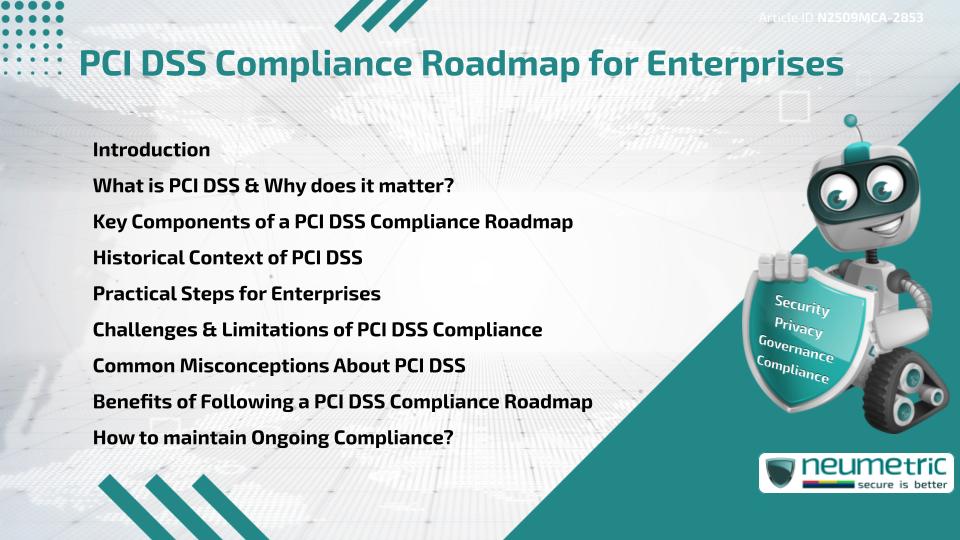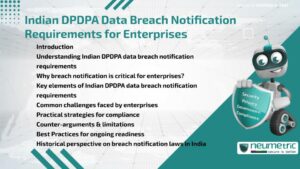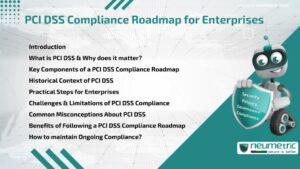Table of Contents
ToggleIntroduction
A PCI DSS Compliance Roadmap is essential for enterprises that handle credit card transactions. It outlines the structured steps required to meet the Payment Card Industry Data Security Standard [PCI DSS]. This Roadmap helps Organisations safeguard Sensitive Customer Information, reduce Risks of data breaches & maintain Trust with Clients & Partners. Without it, enterprises may face Penalties, Reputational damage & Financial loss. By understanding its key elements, historical context, practical applications & limitations, Organisations can approach compliance more effectively & sustainably.
What is PCI DSS & Why does it matter?
The Payment Card Industry Data Security Standard is a global Security Framework designed to protect Cardholder Data. All enterprises that process, store or transmit payment card information must comply with it. Non-compliance can result in Heavy Fines, Legal Consequences & increased Vulnerability to Cyberattacks. A PCI DSS Compliance Roadmap gives enterprises a step-by-step strategy to achieve these mandatory requirements.
Key Components of a PCI DSS Compliance Roadmap
A PCI DSS Compliance Roadmap typically includes:
- Gap Assessment: Identifying where current practices fall short.
- Remediation Plan: Correcting deficiencies with timelines.
- Documentation: Maintaining clear Policies & Procedures.
- Employee Training: Ensuring staff understand their roles.
- Monitoring & Testing: Regularly evaluating security systems.
- Audit Preparation: Getting ready for external Assessments.
Each step ensures that enterprises move from awareness to action in a structured manner.
Historical Context of PCI DSS
PCI DSS was introduced in 2004 by major credit card companies, including Visa, Mastercard, American Express, Discover & JCB. Before this, enterprises followed inconsistent security practices, leading to frequent data breaches. The Standard unified expectations, ensuring consistency across industries. Over time, the requirements have evolved to address emerging Threats, but the essence remains protecting Customer payment data.
Practical Steps for Enterprises
To follow a PCI DSS Compliance Roadmap effectively, enterprises should:
- Identify all systems handling Cardholder Data.
- Conduct a Self-Assessment using PCI’s official tools.
- Apply Network Segmentation to isolate sensitive systems.
- Implement strong Access Control measures.
- Encrypt Cardholder Data in storage & transmission.
- Monitor & Log all access activities.
A good analogy is road construction: just as builders plan, lay foundations & conduct inspections, enterprises must carefully construct their Compliance Framework.
Challenges & Limitations of PCI DSS Compliance
Enterprises often struggle with resource allocation, as Compliance requires investment in Tools, Staff training & Audits. Smaller Organisations may find the requirements overwhelming. Furthermore, Compliance does not guarantee complete immunity from Breaches-it only reduces Risks. The Roadmap must therefore be paired with broader Cybersecurity practices.
Common Misconceptions About PCI DSS
- “Compliance equals Security”: Compliance is only a baseline; real security requires ongoing vigilance.
- “Only IT teams are responsible”: Compliance involves all departments, from HR to Finance.
- “One-time Certification is enough”: PCI DSS demands Continuous Monitoring & updating.
Benefits of Following a PCI DSS Compliance Roadmap
Enterprises benefit in several ways:
- Reduced Likelihood of Data Breaches
- Enhanced Customer Trust & Loyalty
- Protection from Financial Penalties
- Competitive advantage in secure business practices
When compared to navigating without a map, a Roadmap gives direction, reduces uncertainty & prevents costly mistakes.
How to maintain Ongoing Compliance?
Compliance is not a destination but an ongoing process. Enterprises must:
- Perform quarterly Vulnerability scans
- Conduct annual Risk Assessments
- Regularly update Security Patches
- Refresh Employee Awareness Training
By embedding these practices, Organisations avoid lapses & ensure continuous alignment with PCI DSS requirements.
Conclusion
A PCI DSS Compliance Roadmap equips enterprises with clarity & structure in their security journey. By understanding its history, core components & limitations, Organisations can implement effective safeguards & maintain trust.
Takeaways
- A PCI DSS Compliance Roadmap ensures structured Compliance with PCI DSS.
- Compliance reduces Risks but requires ongoing effort.
- Historical context highlights why consistency is critical.
- Misconceptions must be avoided for lasting effectiveness.
- Continuous Monitoring & Training are essential.
FAQ
What is a PCI DSS Compliance Roadmap?
It is a structured plan that guides enterprises through the steps required to meet PCI DSS requirements.
Who needs to follow a PCI DSS Compliance Roadmap?
Any enterprise that processes, stores or transmits payment card data must follow it.
How often should compliance activities be reviewed?
Compliance activities should be reviewed quarterly & thoroughly assessed every year.
Does following a PCI DSS Compliance Roadmap guarantee no breaches?
No, it reduces Risk significantly but cannot guarantee absolute immunity from Cyberattacks.
What are the penalties for non-compliance?
Penalties can include fines, increased transaction fees or loss of ability to process card payments.
How does Employee Training fit into the PCI DSS Compliance Roadmap?
Training ensures staff understand their roles in protecting Cardholder Data & maintaining Compliance.
Is PCI DSS Compliance only relevant to IT teams?
No, Compliance involves multiple departments, including HR, Finance & Operations.
Need help for Security, Privacy, Governance & VAPT?
Neumetric provides organisations the necessary help to achieve their Cybersecurity, Compliance, Governance, Privacy, Certifications & Pentesting needs.
Organisations & Businesses, specifically those which provide SaaS & AI Solutions in the Fintech, BFSI & other regulated sectors, usually need a Cybersecurity Partner for meeting & maintaining the ongoing Security & Privacy needs & requirements of their Enterprise Clients & Privacy conscious Customers.
SOC 2, ISO 27001, ISO 42001, NIST, HIPAA, HECVAT, EU GDPR are some of the Frameworks that are served by Fusion – a SaaS, multimodular, multitenant, centralised, automated, Cybersecurity & Compliance Management system.
Neumetric also provides Expert Services for technical security which covers VAPT for Web Applications, APIs, iOS & Android Mobile Apps, Security Testing for AWS & other Cloud Environments & Cloud Infrastructure & other similar scopes.
Reach out to us by Email or filling out the Contact Form…





